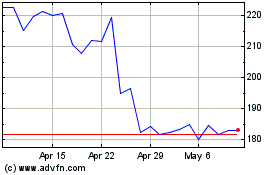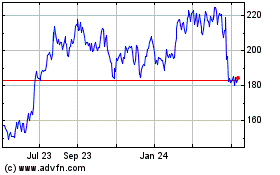By Paul Page
Sign up: With one click, get this newsletter delivered to your
inbox.
Logistics and transportation companies are scrambling to match
hiring to growing demand. Employment in the transportation and
warehousing sector rose by 8,400 jobs from September to October,
WSJ Logistics Report's Jennifer Smith writes, with surging
shipments and an expected boom in e-commerce sales fueling the
employment boost. Some companies are reporting that the only thing
holding back their hiring is their ability to bring new workers on
board in a timely manner. Overall trucking payrolls were
essentially flat last month, according to the broad government
figures, even as operators like less-than-truckload market major
Old Dominion Freight Line Inc. said they added hundreds of workers
and raised pay. Freight businesses are facing more competition for
workers from industries like the construction business, which has
added 11,000 jobs in each of the past two months. Warehousing and
parcel carriers showed the biggest gains for logistics last month
even as retailers cut their payrolls at stores, a strong sign of
where business is going in the coming weeks and beyond.
Retail price wars are already underway and the holiday sales
season hasn't even started. Amazon.com Inc. has started lowering
prices on goods offered by independent merchants on its
marketplace, the WSJ's Laura Stevens reports, potentially lining up
a fierce competition with low-cost rivals just as the critical
shopping season is set to begin. It also sets up a potential
conflict in Amazon's relationships with sellers. The e-commerce
giant generally controls pricing only on the goods it sells
directly, but the new lower prices come with a tag that the
"discount is provided by Amazon." The discounts could be a mixed
bag for some merchants, helping drive sales at no extra cost to the
seller while unexpectedly depleting inventory. And they could
violate a merchant's agreement with a brand on pricing of products.
Third-party sales have become more important to Amazon, boosting
revenue without adding inventory, and the company is showing it's
willing to pay for a bigger share of the market.
The largest supermarket chain in the U.S. wants to sell blouses
along with broccoli. Kroger Co. plans to launch an apparel line in
the coming year in a bid to bring more shoppers into its stores,
the WSJ's Heather Haddon reports, and compete more with big
retailers that have expanded into the grocery business. The move
will add new wrinkles to Kroger's supply chain, from purchasing to
distribution, while extending a shift in the retail world that has
seen stores blur traditional boundaries between various lines of
business. That's largely a result of internet-driven changes in
consumer buying patterns, but for Kroger the push toward clothing
could have a big impact on physical stores. The clothing line will
operate under a private-label umbrella, part of a broader move by
the grocer to push its own branded products. The brand strategy is
aimed at lowering costs while Kroger hopes the clothing line will
give it a bigger share of its customers' buying dollars.
ECONOMY & TRADE
Americans may have some competition this year for a staple of
their holiday dinner table. A newfound taste among Chinese
consumers for cranberries is turning the berries into a booming
export business, the WSJ's Jennifer Levitz reports. That's vaulted
China from barely any consumption five years ago to the
second-largest foreign market for U.S.-processed cranberries last
year. That's been a boon to a niche of the agriculture field that
has been looking to boost domestic and international demand to help
manage large supplies. U.S. cranberry production this year is
expected to be the second-largest in history, after 2016's record
crop, but cranberry consumption is up only slightly. The export
surge is the latest example of how changes in buying patterns in
China can cause big waves around the world because of the sheer
scale of the consumer market. And the consumer tastes for those
imports are triggering more investment in supply chains within
China, including the refrigeration needed to get the goods to
market.
QUOTABLE
IN OTHER NEWS
Global oil prices hit a two-year high today after Saudi Arabia
made a string of arrests in a corruption crackdown. (WSJ)
A new U.S. government report draws a direct line between human
activity and the quickening pace of climate change. (WSJ)
U.S. trade rose at a strong pace in September, with imports up
1.2% by value and exports rising 1.1%. (WSJ)
A broad gauge of U.S. services activity ticked up in October to
its highest level in more than 12 years. (WSJ)
Canadian exports fell in September for a fourth straight month.
(WSJ)
Canada's economy added a net 35,000 jobs in October, far ahead
of expectations. (WSJ)
Documents show U.S. Commerce Secretary Wilbur Ross didn't
disclose connections between his interests in a shipping business
and Russian President Vladimir Putin's family and inner circle.
(WSJ)
Sears Holdings Corp. plans to close 63 more stores early next
year. (WSJ)
Qatar Airways Co. is buying a 9.6% stake in Cathay Pacific
Airways Ltd. (WSJ)
Broadcom Ltd. plans an unsolicited takeover approach to rival
chip maker Qualcomm. (WSJ)
Chip maker Marvell Technology Group Ltd. is in talks to combine
with Cavium Inc. (WSJ)
Nestle SA is acquiring Chameleon Cold-Brew, its second recent
buy of a niche American coffee brand. (WSJ)
U.S. federal investigators have contacted General Motors Co. and
Ford Motor Co. in a probe of job-training programs set up with the
top autoworker union. (WSJ)
Amazon is ending its Fresh grocery delivery service in some U.S.
cities. (Reuters)
CSX Corp. is withdrawing from freight projects in Ohio and North
Carolina as the railroad overhauls its intermodal strategy.
(Trains)
Almost two-thirds of European businesses who buy from British
suppliers expect to shift purchasing to within the single market
after Brexit. (The Guardian)
China lifted its ban on imports of Australian beef. (Sydney
Morning Herald)
The chief of South Korea's SM Line wants to expand in part by
buying domestic and overseas shipping companies. (Lloyd's List)
West Africa's container imports from Asia are rising for the
first time since 2014. (IHS Fairplay)
Honda Motor Co. tripled the number of autos shipped through
Georgia's Port of Brunswick in the past 12 months. (Associated
Press)
Brazil exported a record $641.6 million in vehicles in August.
(Automotive Logistics)
Mazda Motor plans to release electric vehicles with
range-extending rotary engines in 2019. (Nikkei Asian Review)
Japanese logistics company SG Holdings Co expects to raise $1.1
billion in an initial public offering. (Reuters)
The U.S. Postal Service awarded a $214 million contract to
Spartan Motors Inc. to build cargo vehicles. (Lansing State
Journal)
Chicago Rockford Airport in Illinois is upgrading capacity after
seeing a 44% gain in cargo volume in the past year. (The
Loadstar)
ABOUT US
Paul Page is deputy editor of WSJ Logistics Report. Follow him
at @PaulPage, and follow the entire WSJ Logistics Report team:
@brianjbaskin , @jensmithWSJ and @EEPhillips_WSJ. Follow the WSJ
Logistics Report on Twitter at @WSJLogistics.
Write to Paul Page at paul.page@wsj.com
(END) Dow Jones Newswires
November 06, 2017 06:46 ET (11:46 GMT)
Copyright (c) 2017 Dow Jones & Company, Inc.
Old Dominion Freight Line (NASDAQ:ODFL)
Historical Stock Chart
From Mar 2024 to Apr 2024

Old Dominion Freight Line (NASDAQ:ODFL)
Historical Stock Chart
From Apr 2023 to Apr 2024
